‘Letter Home’ is stripped-down Neil Young in his ragged glory

- Share via
Over the last decade, Neil Young has presented an overwhelming volume of studio albums, concert films, archival live recordings, free-form improvised guitar excursions, charity fundraisers, books, rants against modern sound-compression technology, boxed sets and Kickstarter campaigns for high-quality digital audio players. His creative spigot never seems to close.
In the 50 years since he released his first recordings, though, Young, 68, hasn’t until now sat himself down in a 1940s-era Voice-o-Graph recording booth in front of a single microphone and, with the help of Jack White in his Nashville studio and “ancient electro mechanical technology,” recorded a dozen favorite songs using a similar method as did early artists nearly a century ago.
Nor has he recorded a spoken-word introduction, written in the form of a letter to his late mom living in the sweet hereafter, as he has on the delicately rendered, raw “A Letter Home.”
The question is, should he have? Well, as Young himself is wont to say (assume high-pitched Canadian accent): “Sure. Why not?”
Featuring compositions by a dozen songwriting men of a certain era, including Bob Dylan, Willie Nelson, Tim Hardin, Phil Ochs, Bruce Springsteen and the Everly Brothers, “A Letter Home” is as simply rendered as it sounds and captures an aging Young in all his ragged, crackled glory celebrating the power of song to convey harrowing emotions.
On Bert Jansch’s “Needle of Death,” the singer offers a minor-key love letter to a junkie friend warning of “death so near your soul can’t feel the pain.” Young misses a few notes, stumbles from time to time during transitions and offers a tentative touch of whistling as delicate as it is fearless, but the missteps only add to the catch-the-wind spirit of the endeavor. During Gordon Lightfoot’s “Early Morning Rain,” the artist sings of solitude, a pocketful of sand “in the early morning rain with nowhere to go” and a faraway lover headed to Southern California.
The album was originally released on vinyl for Record Store Day, and this CD doubles the offerings, sort of. In addition to the “standard” recordings of the songs as pressed onto Voice-O-Graph records, the deluxe edition also featured cleaned-up versions. Hearing the Voice-O-Graph versions is a strange experience and immediately places the singer at a remove, as though he’d time-traveled to 1928 and laid down some quickie demos on borrowed Jimmie Rodgers studio time. You can hear the sound of the motor recording the music, of inconsistencies in the pressing, experience the occasional hiss and ride along as Young trips his fingers across his frets.
On Springsteen’s ode to joblessness, “My Hometown,” Young warbles and wavers, stubs his notes and plows right through. He sings songs of remembrance and experience, channeling an ancient period before digitization and satellites, when the sound of a man in front of an amplified microphone was more than enough wonder for one night.
Is it essential? Not really. Get Young’s “Unplugged” instead. Still, underestimate this would-be throwaway record at your peril. Like Dylan’s oft-ignored pair of excellent cover albums of country blues songs, “Good as I Been to You” and “World Gone Wrong,” Young on “A Letter Home” feels wonderfully unfiltered, and that abandon fills the room when listened to with proper pre-Internet focus. On Dylan’s “Girl From North Country,” Young hits a volume on his harmonica that distorts the recording, and when he steps back from the microphone, you can hear the distance.
That said, this record is a tough sell. Those able to strip it of its affiliations and digest it minus the high profiles might hear little more than a man with some songs sitting in a booth — and might even be confused as to why this guy still has a career. In this context, Young sounds like a pitchier Hank Williams without the yodel.
But absent the oppression of a dust-free studio and imposing electronics working to capture sonic perfection, music lives and dies on emotive expression. As the hissed rendition of Hardin’s wrenching “Reason to Believe” confirms, Young has certainly mastered that.
-------------
Neil Young
“A Letter Home”
(Warner Bros./Third Man)
Two and a half stars
More to Read
The biggest entertainment stories
Get our big stories about Hollywood, film, television, music, arts, culture and more right in your inbox as soon as they publish.
You may occasionally receive promotional content from the Los Angeles Times.










